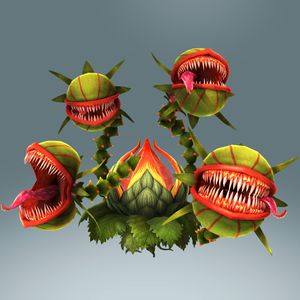| Don't like the ads? Then create an account! Users with accounts have more options than anonymous users. |
Manhandla
- This article is about the recurring plant species. For the member of the species from the Four Swords-branded games which has the same English name, see Manhandla (The Legend of Zelda: Four Swords).
| Manhandla | |||
|---|---|---|---|
 Artwork of a Manhandla from Hyrule Warriors | |||
| First appearance | The Legend of Zelda (1986) | ||
| Latest appearance | Hyrule Warriors: Definitive Edition (2018) | ||
| Variant of | Piranha Plant | ||
| |||
| |||
| |||
Manhandlas are large, four-headed Piranha Plants[1] that appear as bosses in some The Legend of Zelda games and Hyrule Warriors. They first appear in the titular The Legend of Zelda.
Their name is a pun on "manhandle," meaning to handle roughly, and possibly "mandala," a family of radially-symmetrical symbols.
History[edit]
The Legend of Zelda series[edit]
The Legend of Zelda[edit]

A Manhandla is the third boss in The Legend of Zelda and is encountered at the end of the Manji labyrinth. Its mouths open and close constantly. Manhandlas are later encountered as enemies in the Snake and Lion labyrinths. In the Second Quest, Manhandlas are enemies in Level-2, Level-5, Level-6, and in Level-7, which has two Manhandlas. Manhandlas are an optional fight in most labyrinths.
During each battle, the Manhandla tries to attack Link by either shooting fireballs or ramming into him. Link must destroy every head to defeat the Manhandla. Each head can be defeated if Link strikes them four times with his sword. The blast radius of a bomb instantly destroys any head in contact with it. When all four heads are destroyed, the Manhandla is defeated.
Manhandlas' heads and base are colored blue, as shown from its sprite and artwork alike.
The Legend of Zelda: Oracle of Seasons[edit]

In The Legend of Zelda: Oracle of Seasons, a Manhandla is the sixth boss, located at the end of the Ancient Ruins. It is now depicted as an enormous Buzz Blob and its four heads are colored red, further reflecting it as a relative of Piranha Plants.
Manhandla is fought in a room filled with quicksand. It starts attacking by shooting fireballs in four directions. Unlike the first game, a boomerang, more specifically the Magic Boomerang, is required to attack Manhandla. Link must throw it when Manhandla's heads are open. When a head is hit a few times, it gets destroyed. When all four heads are destroyed, Manhandla's base moves around rapidly in a figure-∞ pattern. Link can continue attacking Manhandla by throwing the Magic Boomerang at it. When hit enough times, Manhandla's base opens, revealing a red core which Link must slash repeatedly before it closes or until it is defeated. If Link slashes at its base while it is closed, he gets electrocuted and loses two hearts After defeating Manhandla, Link can obtain the sixth Essence of Nature, the Blowing Wind.
Hyrule Warriors[edit]
In Hyrule Warriors, Manhandlas (subtitled "Poisonous Tree") are encountered in a few scenarios of the Legends Mode and the Adventure Mode, first being in the Valley of Seers. Each Manhandla's base and four heads are coated in metallic armor; without the armor, it is green. Its four heads are extended by arms made from orange-spiked balls. Each head has pink lips, a tongue with stamen-like growths, a pair of thin, sharp teeth, and some protruding, green spikes. When the armor dissipates for certain attacks, the heads can be attacked with the Boomerang to stun them, and when all four heads are knocked out, the entire plant is as well. A large bud containing a pink flower is on top of the base. When the Manhandla is stunned, the bud opens, showing a large growth in the middle of the flower that acts as a weak point for a Weak Point Smash.
In battle, Manhandlas can do many attacks, only two of which leave them vulnerable. These are for all active heads to rapid-fire shoot seeds at the player or allies, after which their armor dissipates, and to line up all active heads without armor and lunge each out one-by-one. Other attacks include dashing around randomly while making a high pitched noise, sitting still while spewing a large circle of poison around itself, and simply spinning around rapidly. Additionally, in the first scenario one appears in in Legends mode, it burrows underground and causes Manhandla Stalks to appear throughout the battlefield.
In Adventure Mode, Manhandla Stalks only appear independently of Manhandlas. In Hyrule Warriors Legends and Hyrule Warriors: Definitive Edition, the Great Sea Map and Master Wind Waker Map have a Manhandla act as a stand-in for the similar Kalle Demos.
Gallery[edit]
-
BS Zelda no Densetsu
Names in other languages[edit]
Manhandla[edit]
| Language | Name | Meaning |
|---|---|---|
| Japanese | テスチタート Tesuchitāto |
Testitart |
Poisonous Tree: Manhandla[edit]
| Language | Name | Meaning |
|---|---|---|
| Japanese | 猛毒邪触樹テスチタート Mōdoku Yokoshima Sawa Ki Tesuchitāto |
Poisonous Evil-Feelered Tree Testitart |
References[edit]
- ^ The Legend of Zelda Japanese manual, page 37


